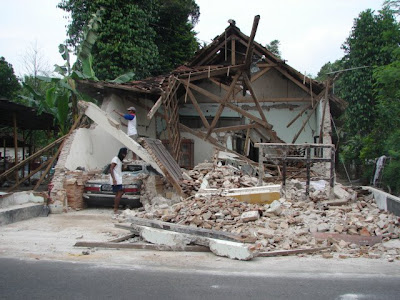Sure, skewering the Indianapolis Star is kind of like beating up a retarded puppy, but it's still worth some fun on a Friday afternoon.
Reader Purdue Matt shared a link to a really handy -- and timely! -- story in the Indy Star today. Let's take a look together, shall we?
During an earthquake, the best thing to do is to get under something that is structurally sound, like a table or a doorway, urges Debbi Fletcher of the Marion County Department of Emergency Management.
Other options for structurally sound objects to get under include the roof of your house. Items to avoid that are non-structurally-sound include IU's hiring process and Terry Hutchens' writing skills.
Remember that earthquakes can have aftershocks, which can be has strong as the original earthquake. "These can go on for a long time" after the original earthquake occurred, so it's best to stay alert.
I like how "these can go on for a long time" is in quotes and kind attributed to nobody in this paragraph... kind of like it was put in quotes by a disbelieving writer:
"Yeah... 'these can go on for a long time.' Sure, sure they can. Whatever!"
"(People) need to be aware that this is something that can happen," she said.
The Star is hitting a home run here with kooky editing. Why is "(People)" in parenthesis? You do this when you're indicating that they said something else but meant people. Did she say, "Human beings need to be aware..."
Once everything clears up, check and make sure everyone in your home - including pets - is safe, she said. "Life safety is the most important thing."
Maybe to you. My bottle cap collection is the most important thing to me.
After you've checked on people and pets, walk your home, checking for any damage. If there are any cracks in walls or floors,
Or, you know, walls missing.
call a trusted contractor.
Don't call a shady muthaeffer.
Also, if there is damage to power or gas lines, contact the utility for help.
Honestly, do people need to be told this? Also, don't light a match to confirm gas leaks.
"Basic preparedness is the same for just about everything," she said, adding that it's a good idea to have a plan to get out of your home in case of roof collapse or gas leaks.
A plan to get out of my home. Goodness, why didn't I think of that? Having a plan to get out of my home would not only help in emergencies, but it would also come in handy every morning when I leave for work and constantly find myself walking into closets.
Fletcher suggested keeping a pair of shoes and a flashlight under the bed, just in case you need to leave your home in a hurry.
It also allows the guy your wife is nailing when you're not around to have a handy escape hatch.
During an earthquake, it is usually best to stay in your home. However, if there is severe structural damage, roof collapse or a gas leak, or anything that would threaten immediate safety, you should exit your home as quickly as possible.
I'm printing this one out. So when we're huddled under the bed, riding out an Earthquake, and the house begins to collapse around us while gas lines are exploding and the roof is coming down in large chunks, and my wife is insisting we stay where we are, I can say, "No! Look! I have the advice right here...next to my shoes and flashlight!"
This is the first earthquake Fletch has experienced since working for Emergency Management.
I like that it's suddenly all casual... "Fletch."
No word yet on Terry Hutchens' take on things, but I'm sure Tom Crean handled it in a very classy way and drove many miles to stand behind the Emergency Management team and let them know he was there not as the IU basketball coach, but as a friend. And if anybody needs a screen to show an emergency management presentation on, Tom is always willing to lend out his forehead.


